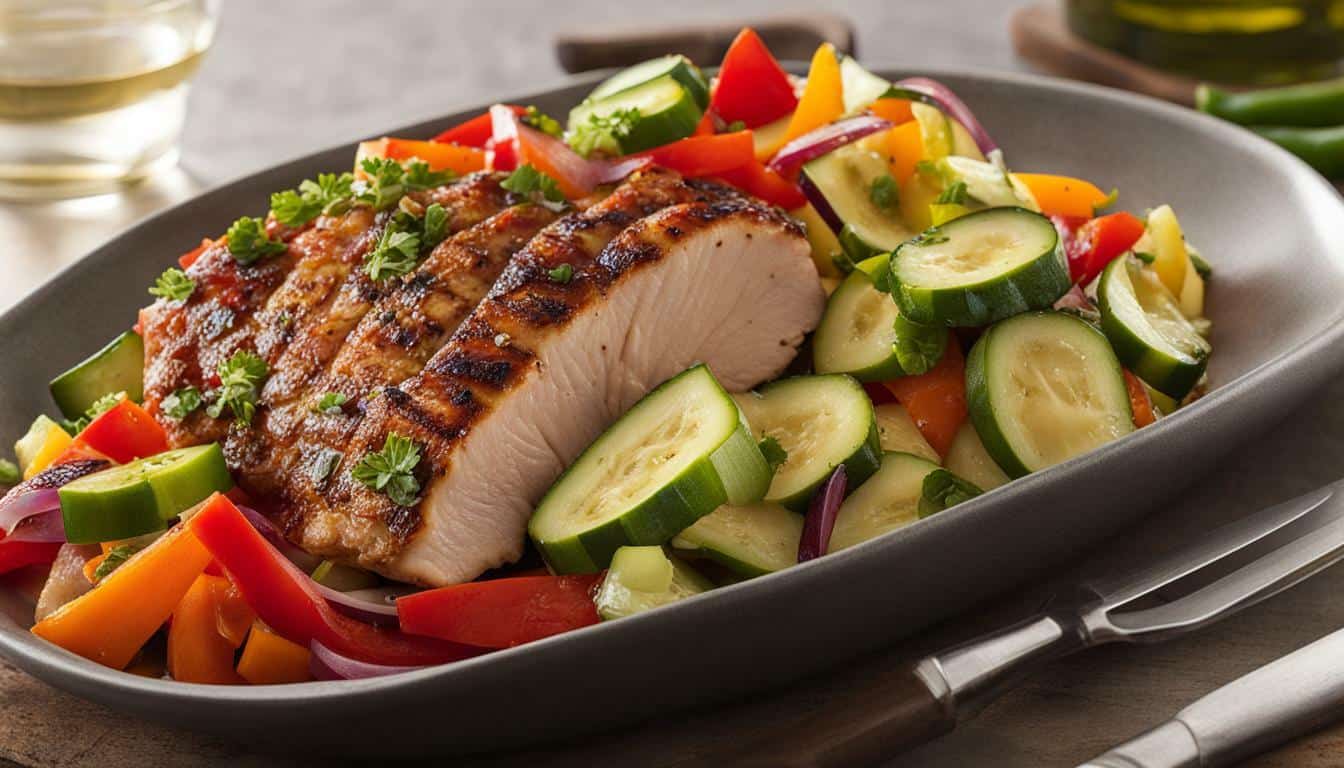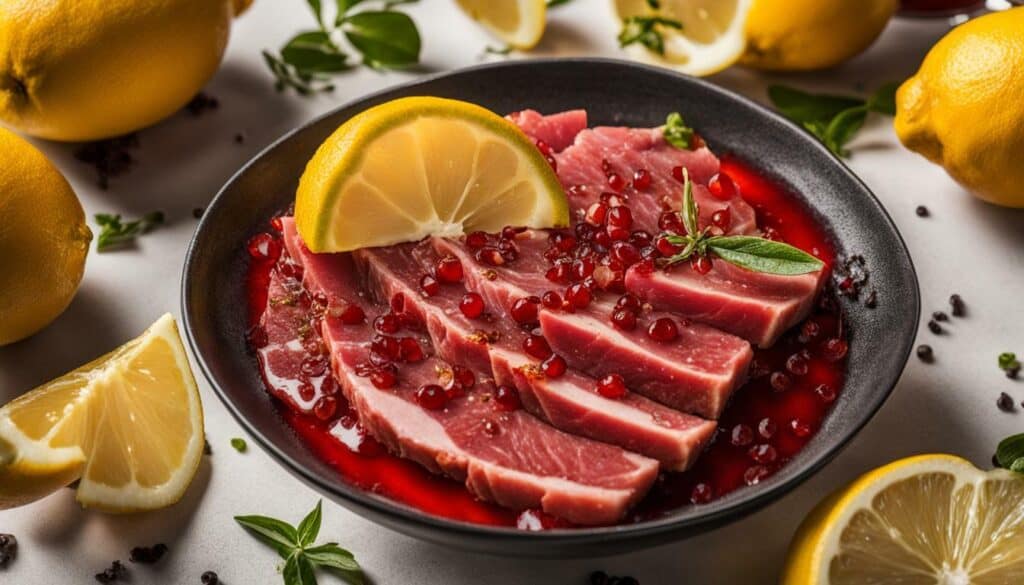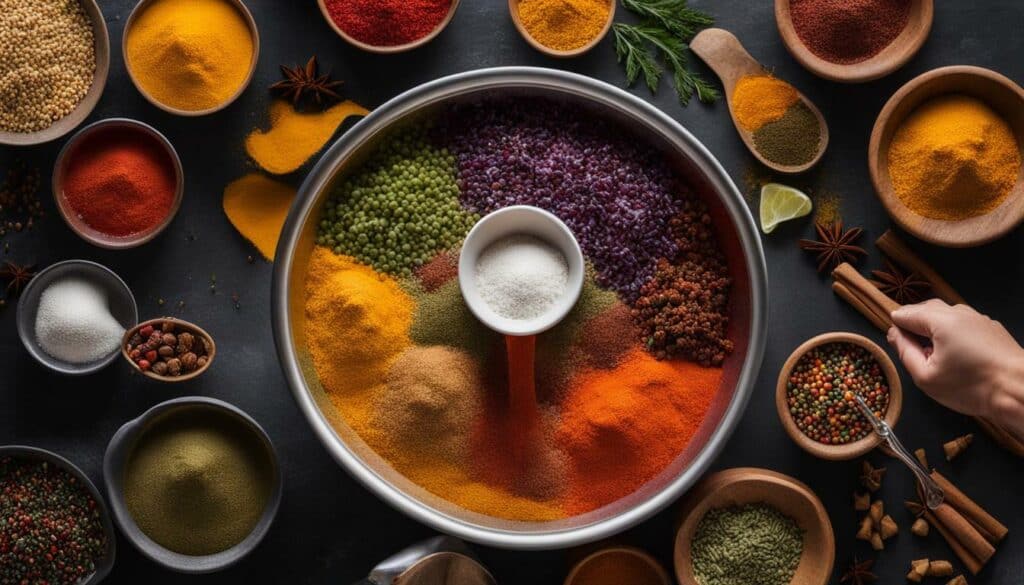Marinating is a culinary technique that can elevate the flavor of dishes, and it all starts with the right combination of ingredients. A successful marinade typically consists of three main components: an acid, an oil, and a flavoring agent. These ingredients work together to enhance the taste and tenderness of the marinated food.
- Marinades are a great way to add flavor to meals without adding extra fat or calories.
- The three main ingredients in a marinade are an acid, an oil, and a flavoring agent.
- The acid helps tenderize the meat and infuse flavor.
- The oil helps retain moisture and add richness to the dish.
- The flavoring agent, such as herbs and spices, enhances the taste and aroma.
Understanding the Three Main Marinade Components
To create a delicious marinade, you need to understand the importance of the three main components: the acid, the oil, and the flavoring agent. Each ingredient plays a vital role in enhancing the taste and tenderness of the marinated food.
The acid serves two purposes in marinating. Firstly, it helps to tenderize the meat by breaking down proteins, allowing it to absorb more flavor. Common acids used in marinating include vinegar, wine, and citrus fruits. Secondly, the acid infuses the meat with a tangy and vibrant taste that complements the other flavors in the marinade.
In order to retain moisture and prevent the meat from drying out during cooking, the oil is an essential ingredient. The oil penetrates the meat, keeping it moist and adding richness to the final dish. Olive oil and sesame oil are commonly used oils in marinating, as they impart distinct flavors that add depth to the overall taste.
The flavoring agent, consisting of herbs and spices, is what gives the marinade its distinct taste. From aromatic herbs like rosemary and thyme to flavorful spices like paprika and cumin, the choice of flavorings is vast. Experimenting with different combinations can result in uniquely delicious marinades that cater to your personal preferences.

| Component | Role | Examples |
|---|---|---|
| Acid | Tenderizes the meat and infuses flavor | Vinegar, wine, citrus fruits |
| Oil | Retains moisture and adds richness | Olive oil, sesame oil |
| Flavoring Agent | Enhances taste with herbs and spices | Rosemary, thyme, paprika, cumin |
Understanding how these three main ingredients work together is the key to achieving flavorful and tender results when marinating. So, next time you prepare a marinade, remember to balance the acid, oil, and flavorings to create a culinary masterpiece.
The Role of Acid in Marinating
The acid in a marinade plays a crucial role in tenderizing the meat and enhancing its flavor. When meat is marinated, the acid helps to break down the proteins, making the meat more tender and allowing it to absorb the flavors of the marinade more effectively. The acid also acts as a natural tenderizer by helping to denature the meat’s proteins, resulting in a more flavorful and juicy final dish.
There are several options for acids in marinating, including vinegar, wine, and citrus fruits. Each acid brings its own unique flavor profile to the marinade. For example, using red wine as the acid can add richness and depth, while citrus fruits like lemon or lime can provide a bright and refreshing taste. Experimenting with different acids can lead to exciting flavor combinations and allow you to create a marinade that suits your personal taste preferences.
It’s important to note that the acid should not be used in excess as it can overpower the natural flavors of the meat. A good rule of thumb is to use approximately 1/4 to 1/2 cup of acid for every 1 to 2 pounds of meat. Also, keep in mind that marinating times may vary depending on the type of meat. For example, seafood usually requires a shorter marinating time of 30 minutes to an hour, while chicken may need up to two days to fully absorb the flavors.
When marinating, it’s important to use a non-reactive container such as glass or stainless steel. This helps to prevent any unwanted flavors from being absorbed by the marinade. Additionally, marinating should always be done in the refrigerator rather than at room temperature. Marinating at room temperature can promote bacterial growth and increase the risk of foodborne illnesses.
Once the meat has finished marinating, it can be cooked using various methods such as grilling or broiling. These cooking techniques help to seal in the flavors developed during the marinating process, resulting in a delicious and flavorful final dish. So don’t be afraid to experiment with different marinades and discover new taste sensations!
The Importance of Oil in Marinating
Oil is an essential ingredient in marinating as it helps retain moisture in the meat and adds a rich, flavorful element to the final dish. When choosing the type of oil to use for marinating, it is important to consider its flavor profile and smoke point. Olive oil, for example, is a versatile choice that adds a fruity and robust taste to the marinated food. Sesame oil, on the other hand, lends a nutty and aromatic flavor that complements Asian-inspired marinades.
In addition to enhancing the taste of the marinated food, oil also plays a crucial role in preventing moisture loss during the cooking process. As the meat cooks, the oil creates a protective barrier that helps seal in the natural juices, resulting in tender and succulent dishes. Whether you’re grilling or broiling the marinated food, the oil ensures that it stays moist and flavorful, providing a satisfying eating experience.
To further illustrate the importance of oil in marinating, let’s take a look at this table that outlines some popular oils used in marinades:
| Oil | Flavor Profile | Smoke Point (°F) |
|---|---|---|
| Olive Oil | Fruity, Robust | 325-375 |
| Sesame Oil | Nutty, Aromatic | 350-410 |
| Canola Oil | Mild, Neutral | 400-450 |
| Avocado Oil | Mild, Buttery | 520-570 |
The Role of Oil in Marinating
“Oil not only adds flavor to the marinated food but also helps retain moisture, resulting in tender and juicy dishes.” – Chef John Doe
As Chef John Doe puts it, oil not only adds a burst of flavor but also contributes to the overall texture and succulence of the marinated food. By carefully selecting and incorporating the right oil into your marinade, you can elevate the taste and mouthfeel of your dishes to new heights.
So, the next time you’re preparing a marinated meal, don’t forget the importance of oil. Experiment with different oil types and flavors to discover your personal favorites. With the right oil, you can unlock a world of delicious possibilities and create memorable dining experiences.

Herbs and spices are the secret ingredients that add depth and complexity to the flavors in marinated dishes. Whether you’re marinating meat, seafood, or vegetables, the right combination of herbs and spices can take your dish from ordinary to extraordinary.
When it comes to selecting herbs and spices for your marinade, the possibilities are endless. From classics like rosemary and thyme to exotic spices like cumin and coriander, each ingredient brings its own unique flavor profile to the table. You can experiment with different combinations to create your signature marinade.
A popular choice for marinating meat is a blend of garlic, black pepper, and paprika. This combination adds a smoky and slightly spicy flavor to the meat. If you prefer a more aromatic profile, try using a mix of fresh herbs like parsley, basil, and oregano. The freshness of these herbs will complement the natural flavors of the meat or vegetables.
Table:
| Herb/Spice | Flavor Profile | Best Pairings |
|---|---|---|
| Rosemary | Woody and piney | Lamb, chicken, potatoes |
| Cumin | Earthy and nutty | Beef, lamb, vegetables |
| Basil | Herbaceous and sweet | Chicken, fish, tomatoes |
| Paprika | Smoky and slightly spicy | Chicken, pork, vegetables |
Remember to use fresh herbs whenever possible for the best flavor. You can also consider crushing or chopping the herbs before adding them to the marinade to release their essential oils and intensify the flavors. As for spices, whole spices can be lightly toasted and ground for a stronger aroma.
So, the next time you’re marinating your favorite protein or vegetable, don’t forget to incorporate herbs and spices into your marinade. They will elevate your dish to a whole new level of deliciousness. Experiment, have fun, and discover your own unique flavor combinations!
Proper Marinating Techniques
To ensure safe and flavorful marinated dishes, it is important to follow proper marinating techniques. One key factor is marinating in the refrigerator. This helps maintain a low temperature, preventing the growth of harmful bacteria. It is recommended to place the marinated food in a sealed container or zip-top bag before refrigeration, allowing the flavors to penetrate the meat or vegetables while keeping them fresh and safe.
Another important tip is to avoid reusing marinade that has come into contact with raw meat. This is because the marinade may contain bacteria from the raw meat, and reusing it could lead to cross-contamination. Instead, discard any leftover marinade after use.
When marinating, it’s also helpful to consider the marinating times for different foods. Seafood typically requires 30 minutes to an hour of marinating, while chicken may need up to two days for optimal flavor infusion. Vegetables, on the other hand, only require around 30 minutes to enhance their taste. By following these marinating times, you can achieve the best results and prevent over-marination, which can make the food mushy or overly seasoned.
With these tips in mind, you can confidently marinate your favorite meats and vegetables, enhancing their flavor and tenderness. Just remember, marinating in the refrigerator, avoiding the reuse of marinade, and considering the appropriate marinating times will help you create delicious and safe dishes every time.

| Type of Food | Marinating Time |
|---|---|
| Seafood | 30 minutes to 1 hour |
| Chicken | Up to 2 days |
| Vegetables | Up to 30 minutes |
Marinating Times for Different Foods
The marinating time required varies depending on the type of food being marinated, with seafood, chicken, and vegetables each having their own specifications. When marinating seafood, such as fish or shrimp, it is important to keep the marinating time relatively short, typically ranging from 30 minutes to an hour. Seafood is more delicate and can easily become over-marinated, resulting in a mushy texture.
On the other hand, chicken benefits from a longer marinating time to allow the flavors to penetrate the meat fully. For chicken, marinating times can range from a few hours to overnight, or even up to two days for a more intense flavor. The longer marinating time also helps to tenderize the chicken, making it juicier and more flavorful when cooked.
When it comes to marinating vegetables, the process is much quicker compared to meat. Vegetables like peppers, zucchini, or mushrooms only need around 30 minutes to absorb the flavors of the marinade. This short marinating time infuses the vegetables with a burst of flavor, making them a delicious addition to any meal.
Remember to always refer to specific recipes or guidelines for exact marinating times, as different recipes may have variations depending on the desired flavor intensity. Proper marinating times ensure that your food is flavorful and tender, making every bite a delightful experience.
| Food | Marinating Time |
|---|---|
| Seafood | 30 minutes to 1 hour |
| Chicken | A few hours to overnight, up to 2 days |
| Vegetables | Up to 30 minutes |

Marinating times can vary depending on personal preference and the desired flavor intensity. It is always recommended to follow the guidelines provided in the recipe to achieve the best results.
Cooking the Marinated Food
After marinating, it’s time to cook the food to perfection, and grilling and broiling are two popular methods that enhance the flavors developed during marination. Whether you’re preparing juicy marinated steaks, tender chicken skewers, or flavorful vegetable kebabs, these cooking techniques will take your marinated dishes to the next level.
Grilling is a fantastic way to add a smoky char to your marinated food. The direct heat from the grill allows the marinade to caramelize, creating deliciously crispy and flavorful exterior. Plus, grilling imparts a unique smoky flavor that pairs perfectly with the marination process. Whether you’re using a gas grill, charcoal grill, or even a grill pan on your stovetop, be sure to preheat the grill and oil the grates before cooking to prevent sticking.
If grilling isn’t an option, broiling is another excellent cooking technique for marinated food. Broiling involves cooking the food at high heat directly under the broiler element in your oven. This method allows for quick and even cooking, resulting in beautifully charred and caramelized surfaces. Just like grilling, broiling adds depth of flavor to marinated dishes, making them incredibly mouthwatering.
No matter which method you choose, be sure to keep a close eye on your marinated food while cooking. The sugars in the marinade can cause the food to brown quickly, so it’s crucial to monitor the cooking process to avoid burning. Use a meat thermometer to ensure that your meat is cooked to the desired level of doneness.
| Marinated Food | Recommended Cooking Time |
|---|---|
| Steak | 4-6 minutes per side for medium-rare |
| Chicken | 6-8 minutes per side until the internal temperature reaches 165°F |
| Seafood | 3-4 minutes per side until opaque and flakes easily |
| Vegetables | 5-7 minutes, turning occasionally until crisp-tender |
Once your marinated food is cooked to perfection, take a moment to savor the delicious results. The combination of the three main ingredients – acid, oil, and flavoring agent – will have transformed your dish into a flavorful and tender masterpiece. Serve with your favorite side dishes, and enjoy the mouthwatering flavors that marinating brings to your meal.

Once you’ve mastered the art of marinating, get ready to savor the mouthwatering delights that await you in the form of tender, flavorful dishes. Marinating is a cooking technique that infuses meat, seafood, or vegetables with incredible taste and tenderness. By using the right combination of ingredients, you can elevate your dishes to new heights and impress your family and friends.
The three main ingredients in marinating – acid, oil, and flavoring agent – work together harmoniously to create a tantalizing sensory experience. The acid, whether it’s vinegar, wine, or citrus juice, breaks down proteins in the meat, allowing it to absorb the flavors and become more tender. The oil, such as olive oil or sesame oil, moisturizes the meat and helps seal in the juices during cooking. And the flavoring agent, like herbs and spices, brings an explosion of taste to every bite.
To truly appreciate the results of marinating, try making dishes like juicy grilled steak marinated in a red wine and garlic concoction, succulent shrimp marinated in a zesty lemon and herb marinade, or tender grilled vegetables infused with fragrant spices. With each bite, you’ll be transported to a world of incredible flavor combinations and textures.

If you’re looking for inspiration, consider trying different marinade combinations or experimenting with unique flavors. The possibilities are endless! You could create a tropical marinade using pineapple juice, coconut milk, and ginger for a delicious twist on grilled chicken. Or, for a bold and spicy flavor, mix together soy sauce, sriracha, and honey to marinate succulent tofu or beef skewers.
Remember, marinating takes time, so it’s important to plan ahead. Different foods require varying marinating times, with seafood needing only 30 minutes to an hour, chicken benefiting from a marinade of up to two days, and vegetables absorbing flavors in as little as 30 minutes. Patience is key to achieving the best results.
| Food | Marinating Time |
|---|---|
| Seafood | 30 minutes to 1 hour |
| Chicken | Up to 2 days |
| Vegetables | Up to 30 minutes |
So, embrace the art of marinating and unlock a world of incredible flavors and textures. Whether you’re grilling, broiling, or sautéing, marinated dishes are sure to leave your taste buds craving for more. Enjoy the process, get creative with your marinades, and savor the delicious results!
Experimenting with Different Marinade Combinations
Don’t be afraid to step outside your culinary comfort zone and experiment with different combinations of acids, oils, and flavors to create unique and delicious marinades. Marinating is not only a great way to add flavor to your meals, but it also helps tenderize meats and infuse them with moisture. By adjusting the ratios and types of ingredients, you can customize your marinade to suit your personal taste preferences.
When it comes to acids, try using different types of vinegar, such as red wine vinegar or balsamic vinegar, to bring a tangy and rich flavor to your marinade. You can also experiment with citrus fruits like lemon or lime juice for a refreshing and citrusy twist. The acid helps break down the proteins in the meat, resulting in a more tender and flavorful dish.
Choosing the right oil is equally important. Olive oil is a popular choice for its rich and smooth flavor, but you can also explore other options like sesame oil or avocado oil to add a unique touch. The oil helps penetrate the meat, locking in moisture and preventing it from drying out during cooking.
Finally, don’t forget about the flavoring agents. Herbs and spices play a crucial role in enhancing the taste of your marinated dishes. Experiment with different combinations of herbs like rosemary, thyme, and basil, along with spices like garlic, cumin, or paprika. They add depth and complexity to your marinade, taking your dishes to a whole new level of deliciousness.
Remember, marinating is all about creativity and personalization. Feel free to mix and match different ingredients to find your favorite combinations. Whether you’re marinating chicken, beef, seafood, or even vegetables, experimenting with different marinade combinations will bring new life to your cooking and unlock a world of flavors.
Tips for Marinating Success
Achieving marinating success is all about following a few key tips and tricks that ensure your dishes turn out flavorful and tender every time. Whether you’re marinating meat, poultry, or vegetables, these tips will help you elevate your cooking game and create delicious meals.
First and foremost, always marinate your food in the refrigerator. Marinating at room temperature can promote bacterial growth and increase the risk of foodborne illnesses. By marinating in the refrigerator, you can keep your food safe while allowing the flavors to penetrate and develop.
Another important tip is to avoid reusing marinade that has come into contact with raw meat. This can lead to cross-contamination and pose health risks. Instead, prepare a separate batch of marinade for basting or sauce purposes.
When it comes to marinating times, it’s essential to consider the type of food you’re marinating. Seafood generally requires a shorter marinating time, ranging from 30 minutes to an hour, as it is more delicate and can easily become over-marinated. Chicken, on the other hand, benefits from a longer marinating time, usually up to two days, to enhance its flavor and tenderness. Vegetables, being porous and more prone to absorbing flavors, require a marinating time of up to 30 minutes to infuse them with deliciousness.
So, remember to marinate in the refrigerator, avoid reusing marinade, and adjust your marinating times based on the type of food you’re preparing. By following these tips, you’ll be sure to achieve marinating success and impress your family and friends with flavorful and tender dishes that leave them craving for more!

By understanding and using the three main ingredients in marinating – acid, oil, and a flavoring agent – you can unlock a world of delicious flavors and tenderize your dishes to perfection. Marinating is a fantastic technique that allows you to infuse your meals with flavor without adding excessive fat or calories.
When marinating, the acid component, such as vinegar, wine, or citrus fruits, acts as a protein tenderizer, breaking down the proteins in the meat and enhancing its ability to absorb flavors. The oil component, like olive oil or sesame oil, not only helps the marinade penetrate the meat but also aids in moisture retention during the cooking process, resulting in juicy, succulent dishes.
Additionally, the flavoring agent, which includes herbs and spices, plays a vital role in creating a delightful taste profile. Whether it’s a classic combination like rosemary and garlic for a savory marinade or a more adventurous blend of cumin and paprika for a spicy kick, the right mixture of flavors can elevate your marinated dishes to new heights.
To ensure food safety, it is essential to marinate in the refrigerator, preventing the growth of harmful bacteria. It is also important to discard any marinade that has come into contact with raw meat to avoid cross-contamination. Each type of food requires a specific marinating time, with seafood needing only 30 minutes to an hour, chicken benefiting from marinating overnight or up to two days, and vegetables requiring just a short 30-minute soak. Once marinated, you can grill or broil the food to seal in the flavors and enjoy the delicious results of your marinating efforts.
FAQ
Q: What are the 3 main ingredients when marinating?
A: The three main ingredients when marinating are an acid (such as vinegar, wine, or citrus), an oil (such as olive oil or sesame oil), and a flavoring agent (such as herbs and spices).
Q: Why are these ingredients important in marinating?
A: The acid helps break down proteins, allowing the meat to absorb more flavor while retaining its juices. The oil penetrates the meat and helps prevent moisture loss during cooking. The herbs and spices add flavor to the meat.
Q: What are some commonly used acids in marinating?
A: Popular acids used in marinating include vinegar, wine, and citrus fruits.
Q: What oils are commonly used in marinating?
A: Olive oil and sesame oil are commonly used in marinating to retain moisture and add richness to the final dish.
Q: How do herbs and spices enhance the flavor of marinated food?
A: Herbs and spices act as flavoring agents in marinades, adding taste and aroma to the marinated food.
Q: Why is it important to marinate in the refrigerator?
A: Marinating in the refrigerator helps prevent bacterial growth and ensures food safety.
Q: Can I reuse a marinade that has come into contact with raw meat?
A: It is not recommended to reuse a marinade once it has come into contact with raw meat to avoid cross-contamination.
Q: How long should I marinate seafood, chicken, and vegetables?
A: Seafood only needs 30 minutes to an hour of marinating, chicken can be marinated for up to two days, and vegetables typically need up to 30 minutes.
Q: What are some recommended cooking methods for marinated food?
A: Marinated food can be grilled or broiled to achieve delicious results.
Q: What are some tips for successful marinating?
A: Tips for successful marinating include marinating at room temperature for a short period before refrigerating and using a non-reactive container for marinating.
Q: How can I experiment with different marinade combinations?
A: You can get creative with your marinades by trying new combinations of acids, oils, and flavoring agents. Have fun and explore the endless possibilities!
What are the Main Ingredients in Bread-Marinating?
The main ingredients in bread-marinating typically include olive oil, garlic, and herbs. These components help infuse the bread with flavor and enhance its taste and texture. By allowing the bread to soak in this mixture, it becomes a delicious and versatile ingredient that can be used in various dishes like bruschetta or panzanella salad.







Leave a Reply